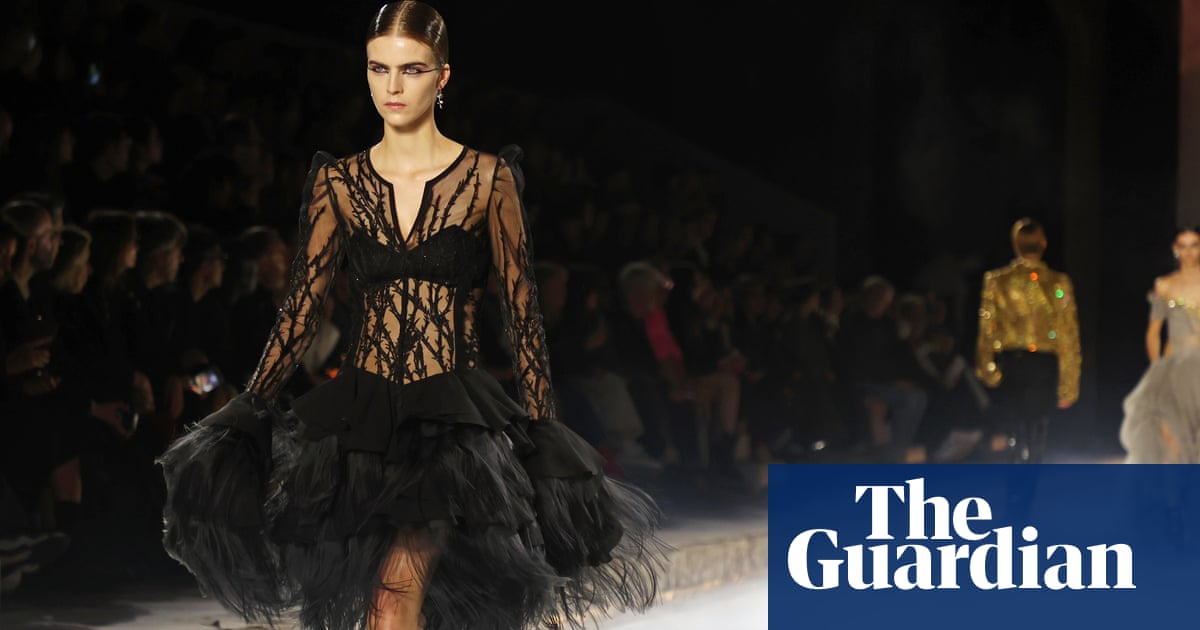Fashion
A little light enters the shade of McQueen’s gothic DNA in Paris

While Seán McGirr’s debut as creative director of Alexander McQueen was held in an underground concrete venue, in keeping with the McQueen spirit of presenting at a rebellious distance from Paris’s glitzy centre, for his second collection, the Irish-born, London-based designer went for a sharp about-turn: a fine art school on the capital’s well-heeled Left Bank.
Eerie strings played as guests filed into the grand, cavernous hall of the École Nationale Supérieure des Beaux-Arts. Anna Wintour seemed in jolly spirits as she chatted chummily with Salma Hayek and her husband, François-Henri Pinault, the CEO of luxury conglomerate Kering, which owns McQueen. An eclectic front row included British fashion designer and socialite Daphne Guinness and American rapper Cardi B, who was shrouded in a fur coat. Scuzzy was out, sheen was in.
But the brand’s gothic, witchy DNA was writ large in the choice of muse, the collection inspired by the looming figure from Irish folklore: the banshee, a female spirit whose wails, or “keening”, are said to foretell the death of a family member. As a remarkably composed McGirr explained backstage after the show: “It’s a common thread that runs between me and McQueen.” She also haunted a gothic 1994 collection called, simply, Banshee, in which, famously, a visibly pregnant model with a shaved head walked to a soundtrack of screaming. “I started by looking at his sketches from that show which we have in the archives,” said McGirr, an archive he said was full of treasure, such as “unfinished toiles, fabric scraps, shoes that are half beaten away”.
McGirr’s take on the banshee legends, which he “grew up with – stories that my mother, my grandmother spoke to me about” – featured washed and shredded silk chiffon and organza dresses worn on a steel catwalk engulfed in smoke.
Silhouette has always been central to the McQueen universe and sharp tailoring with exaggerated shoulders came with fog-like swirls on the front. There were very pretty red carpet-ready frocks with witchy twists and plenty of sparkle and a final look that seemed fated to end up on the Met Gala red carpet: a hooded dress made from a web of sparkly strings. It was McGirr’s take on the banshee herself who, he said, is for him a “guiding presence” who he dreamed about as a kid and has again in the last six months. “That’s why it felt relevant.” The palette swirled around silvery grey, ivory and jet black but had flashes of alarming orange and yellow.
There was a throughline from the 1994 collection. Idiosyncratically cursive collars from the original collection were, for instance, hyperbolised and looked like outsized upside down peace lily petals.
The comb, a central object in banshee lore – it is said that if she loses it she will come to the house where it is and try to reclaim it – appeared first on the show’s invitation, sketched with a spiked back by Gonzo-illustrator Ralph Steadman. But it was also, explained McGirr, “brought into the process of making the actual clothes. So everything’s combed by hand and shredded and poetically frayed.”
The sophomore collection is a famously tricky one. Although so was the debut, which was met with mixed reactions by the industry. In many ways perhaps, the McQueen gig is a tough one; to take the helm of an eponymous label with such a rich and audacious heritage.
As McQueen said: “If I ever leave my company, I’ll burn it down so that no one can work there. This person would have to invent the concepts for my shows, which are so personal, how would that be possible?” The need to be at least a bit derivative is sort of baked in. McGirr is the first designer not to have known the late founder – Sarah Burton, who was at the helm for the 13 years, taking over in 2010 after McQueen’s death and leaving last year, had been McQueen’s unassuming former deputy.
For those who were there for the original McQueen shows – and think more of the house as the kind inspired by dirt, death and golden showers – the choice of venue could be taken as a metaphor for the direction the label seems to be heading with McGirr at the reins. As the 35-year-old designer told Vogue, he wants to “let the light in”. Someone may be hoping that a bit of light, and glitz and glamour, may help to make the label more accessible, buzzy for a younger audience and, crucially, commercial.










